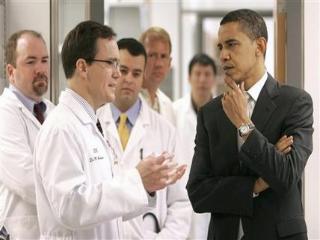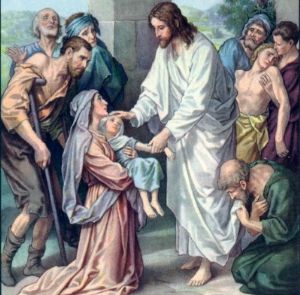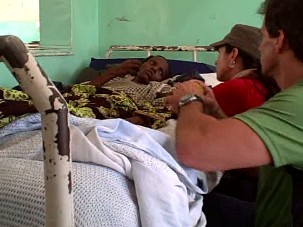 Pollster and author George Barna posted a thought-provoking article this morning on the health care reform debate going on in the U.S. He takes a look at how Americans want to address heath care and how Jesus dealt with the sick people he encountered.
Pollster and author George Barna posted a thought-provoking article this morning on the health care reform debate going on in the U.S. He takes a look at how Americans want to address heath care and how Jesus dealt with the sick people he encountered.
First, according to surveys, the vast majority of Americans think health care deficiencies should be solved by the government more than any other entity or group of people.
Two-thirds of adults look to the government to solve issues related to poverty – including health care deficiencies. Just one out of every five adults believes that solving poverty is an individual duty, and a mere one out of 25 people assigns that task to non-profit organizations, and another one in 25 assigns it to churches.
Second, Americans help those who need health care, but only at arms length.
the most common responses are for people to give money, food, and clothing to someone else to get the job done. In contrast, the most personal responses are the least common. Relatively few Americans talk directly with the needy, tutor them, build homes for them, visit them, befriend them, or engage in other types of personal activities to address the issue.
Barna concludes that the predominant attitude in America towards helping those without adequate health care is “it’s not my fault and it’s not my job, so let the paid professionals deal with it,” oh, and don’t raise my taxes to do it.
Barna then cites 7 principals that underlie Jesus’ health care strategy as found in the Bible.
 Jesus healed people because He believed that good health matters.
Jesus healed people because He believed that good health matters.- Jesus invested Himself in their healing because He loved and cared for people.
- Jesus healed everyone who presented a medical need because He saw no reason to screen some out as unqualified.
- Jesus healed every kind of illness He encountered.
- Jesus pursued them because He saw Himself as a servant.
- Jesus allowed them to disrupt His schedule because He realized that people’s pain and suffering was their top focus in life.
- Jesus expected His closest followers to heal others.
Jesus personally attended to the health care needs of the poor and disenfranchised and he called on his followers to do the same. There’s nothing in scripture that says government programs can’t be part of the solution, but Jesus never passed the buck to the government when sick people were standing in front of him.
My first thought was, “Yeah, well, if I had the gift of healing and through God’s power could instantly cure people with blindness and leprosy (or if I at least some medical training), I would be more personally involved in helping those who need health care.”
Maybe there’s something to that.
 But I also know that I have the same 24 hours in a day that Jesus had and a lot more financial resources than Jesus.
But I also know that I have the same 24 hours in a day that Jesus had and a lot more financial resources than Jesus.
So, what’s your response to those with insufficient health care? Who do you think should be helping them? If you think it’s primarily the government’s responsibility, how do you square that with how Jesus’ approach? And if you oppose a government solution, what are you doing to help those with health needs?
You can read the full article here.
Not really answering the question one way or the other, just some random thoughts come to mind. I sometimes feel like my dollars don’t go far enough when I donate through agencies that are set up to provide aid because of their high overhead costs. I tend to stay away from the big agencies because of that. I do give to primarily smaller agencies. And I have faith that God will prevail. Cuz I know He’s THAT big.
And, honestly, I fall short of this one every single day: “Relatively few Americans talk directly with the needy, tutor them, build homes for them, visit them, befriend them, or engage in other types of personal activities to address the issue.” I especially shy away from men. Just because of the horrific examples of women being abused and/or abducted by seemingly innocent strangers.
Thought provoking post, as always, Paul. I feel as though I should be in confession every time I read your posts. Thanks for sharing. It keeps me growing!
Hey Cristen. I fall short every day too. My hope is not that we dwell on the past and feel guilty, but that we expand our imagination of what God can do through us today and in the future, and then make it happen.
Oh, I know that’s not your intention. LOL No guilt here. 🙂
Your posts are always so deep and thought-provoking.
Jesus counseled individual, real people. He did not advise governments nor other collectives. But hHe told a man how that man should pay for health care for someone in need in his famous parable of the Good Samaritan. Here it is from the Gospel of Luke, chapter 10. The numbers are the verses in the New International Version:
29But he wanted to justify himself, so he asked Jesus, “And who is my neighbor?”30In reply Jesus said: “A man was going down from Jerusalem to Jericho, when he fell into the hands of robbers. They stripped him of his clothes, beat him and went away, leaving him half dead. 31A priest happened to be going down the same road, and when he saw the man, he passed by on the other side. 32So too, a Levite, when he came to the place and saw him, passed by on the other side. 33But a Samaritan, as he traveled, came where the man was; and when he saw him, he took pity on him. 34He went to him and bandaged his wounds, pouring on oil and wine. Then he put the man on his own donkey, took him to an inn and took care of him. 35The next day he took out two silver coins[e] and gave them to the innkeeper. ‘Look after him,’ he said, ‘and when I return, I will reimburse you for any extra expense you may have.’ 36?Which of these three do you think was a neighbor to the man who fell into the hands of robbers?” 37The expert in the law replied, “The one who had mercy on him.” Jesus told him, “Go and do likewise.”
So you see, Jesus explicitly told the man to use his own money as the Good Samaritan had used his to care for one’s less-fortunate neighbor. He most certainly did not tell the man to use OPM! (OPM: sounds like opium, is equally addicting, stands for other-people’s money.) Perhaps the priest and Levite were hoping someone from the government would come along and help the poor fellow with some tax-funded healthcare, but Jesus realized there is nothing generous or noble in voting to spend OPM to secure the poor.
http://www.jesus-on-taxes.com/JESUS_ON_OBAMACARE.html
Hi Paul,
Thanks for the post. HealthCare is a HUGE issue…. yet we all have individual responsibility to care for ourselves as well.
I’m writing a series of posts about a recent book on this topic. The book is titled Health Care You Can Live With written by Dr. Scott Morris, director of the Church Health Center. The link to the tag of my series is the url of the website I’ve provided.
As Morris mentions with detail in the book, over the years, the church has become disconnected in the care for the health of the people it serves. Consequently, people no longer receive the whole-person care that they really need to be well – to be whole. People do not hear the message that our spirits, minds and bodies are interrelated and therefore the care for them must be comprehensive and coordinated.
Have a blessed day!
Dale
Thanks Dale. I think you’re write. The big C church and local churches have pretty much abandoned the issue of health, whether it’s taking care of our own health or helping others with health issues. Thanks for speaking up about this issue.